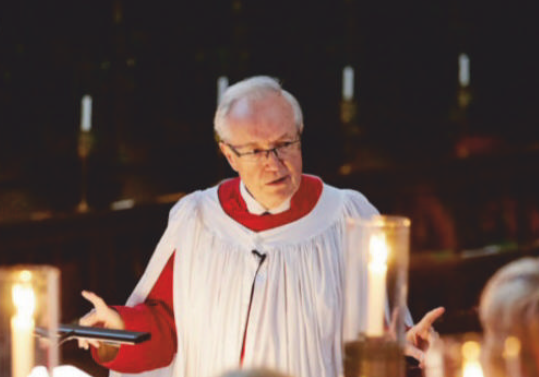Under him the carol service became more ecumenical and open. It had more Latin, like the weekly services, which now featured Latin masses and canticles. His Anglican suspicion of the Roman church had been soothed, when he was really quite young, by singing an especially wonderful melody in Verdi's "Te Deum", and later by the beauty, which he thought inexpressible, of Gregorian chant.
在斯蒂芬·克勞伯里的領導下,頌歌變得更加普世和開放。頌歌中有了更多的拉丁語,就像每周的禮拜一樣,現在以拉丁語彌撒和圣歌為特色。他在很小的時候就通過在威爾第的"贊美頌"中演唱一段特別美妙的旋律,以及后來的他認為無法表達的格里高利圣詠的美打消了英國國教會對羅馬教會的懷疑。
In 1979 he became master of music at Westminster Cathedral, falling deeply in love with the rhythms of the Catholic liturgy. The singing of Latin brought purer vowels into the King's sound, which was pleasing. So too did singing carols in other languages, including Latvian and Church Slavonic. This tested the singers, and made them more expert musicians. It also reminded them—if they needed reminding, with worldwide tours, frequent recording sessions and televised broadcasts of the carol service all over America—that their singing now spanned the globe.
1979年,斯蒂芬·克勞伯里成為威斯敏斯特大教堂的音樂大師,深深愛上了天主教禮拜儀式的節奏。拉丁語的歌唱給國王的聲音帶來了更純正的元音,這是令人愉快的。 用其他語言唱圣誕頌歌也是如此,包括拉脫維亞語和教會斯拉夫語。這對歌手進行了測試,使他們成為更專業的音樂家。這也提醒了他們-如果他們需要的話,通過世界各地的旅游,美國各地頻繁的錄制和電視廣播頌歌儀式——他們的歌聲現在遍及全球。

Like his immediate predecessors, he wrote new descants to freshen up the well-known hymns. His most daring innovation, though, was to commission a new carol every year. A lot of new church music was not of very high quality, and he wished to show that fine composers were still willing to write for liturgical settings. Lennox Berkeley, Arvo Part and John Tavener all wrote one, and he regretted not asking John Adams, since no one said no.
像他的前輩一樣,他創作了新的圣歌來更新著名的贊美詩。但是,斯蒂芬·克勞伯里最大膽的創新是是每年委托制作一個新的頌歌。很多的教堂音樂質量都不是很高,斯蒂芬·克勞伯里希望表明,優秀的作曲家仍然愿意為宗教儀式創作。倫諾克斯·伯克利、阿沃部分和約翰·塔文納都創作了一首頌歌,他后悔沒有邀請約翰·亞當斯,因為沒有人說不。
譯文由可可原創,僅供學習交流使用,未經許可請勿轉載。











